What is it rugby bores say about thugs and gentlemen? The notion that their sport, on its gilded plinth of integrity, could never succumb to the worst excesses of football culture. Rugby is an oasis, free from cynicism and simulation, financial influence, supporter aggro and abusive behaviour.
History tells a different tale: where football leads, rugby tends to follow.
This isn’t another snobby exercise in football-bashing. It is a fabulous sport from which rugby can learn precious lessons. But today’s rugby coaches are suffering from the latest shift towards a football mindset.
The coaching landscape is more brutal than ever. Those determined enough to operate within it understand its perils and embrace its handsome rewards, but even the most passionate have their resolve tested. Patience within boardrooms is dwindling as the economic stakes heighten, the power of fan opinion grows and the immense pressure exerted through social media swells.
The international game has been awash with change these past eight months. Wayne Pivac axed and Warren Gatland sent for by a Welsh Rugby Union wheezing from scandal to crisis. Eddie Jones sacked less than a year from the World Cup, he told us, was his Mona Lisa, handing Steve Borthwick a head-scrambled England squad and scant preparation time. Jones proved irresistible to cash-strapped Rugby Australia, who dispatched Dave Rennie, apparently for no greater reason than Jones was now available. The Italian federation are to let Kieran Crowley go after the World Cup despite the national team’s statement wins and significant upturn in form. All that, before we run the gamut of an increasingly turbulent European club scene.
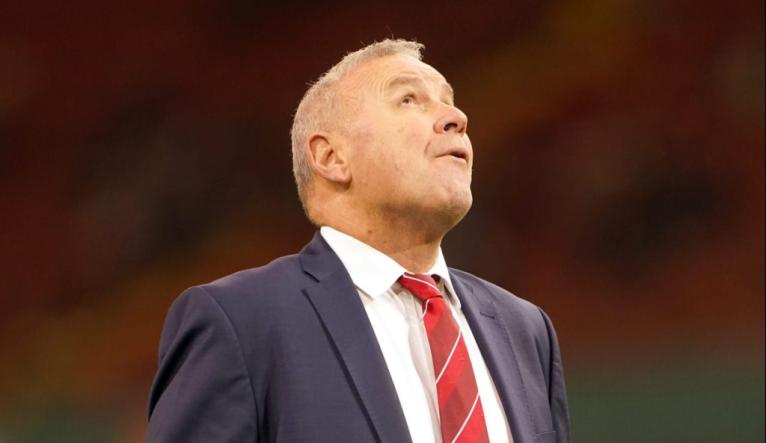
“Rugby is following another sport that loses coaches every week in football – if you don’t get the results, they shoot you,” says Steve Hansen, the former All Black coaching colossus.
“If you’ve got stability then you’ve got an ability to grow. If you haven’t got stability then you have no continuity, you have nothing. People come in, change everything, say ‘what they did last time wasn’t my fault’, and never actually get a solution. It’s a short-term fix which doesn’t normally work. Maybe you get an emotional result pretty quickly but it doesn’t last.”
The reasons for this trend are varied and intriguing. There is a clear societal swing in our approach to life, a disposable world where gratification arrives at the swipe of a screen. Sport is not immune. There are more opportunities for supporters to vent their ire online, and for that ire to cut through to the top. There is a deficit of modern-day rugby nous on the boards who make the ultimate calls.
Crowley was recently informed his contract would not be renewed. The Italians have plumped for a younger, trendier model in Gonzalo Quesada, who has been successful with the Jaguares and Stade Francais. Crowley, though, has developed a fresh, talented squad, got them motoring along with unprecedented positivity and led them to affirming wins over Wales and Australia.
While he has no desire to quarrel publicly with his employers, he says they have never explained his impending exit.
Sometimes appointments are made by people who don’t know what they are doing. It looks like people are making decisions for their own ego.
“It is harder to accept the decisions where you can’t see the reason for it. I’m not talking specifically about my situation, but CEOs do pull the trigger too quickly,” he says. “Sometimes appointments are made by people who don’t know what they are doing. As coaches, we get professional development. We look to improve ourselves. Where is the development or education for those who are actually employing people?
“In rugby, you often get one person making a decision – through their own ego, through people they know, or they don’t do their homework and get the facts. There’s got to be education for boards on who they select and why they select them. The issue with Dave Rennie was bloody disgusting when you take into consideration the facts. It looks, at times, like people are making decisions for their own egos.”
This ego theme is a common thread. And it doesn’t come purely from jilted coaches. Simon Cohen was Leicester Tigers chief executive for eight years. Leicester are England’s biggest beast. Tough decisions and straight talking were Cohen’s bread and butter. As the club toiled, hovering above the Premiership trapdoor, he frequently shouldered the public responsibility for decisions he did not make.
“In a lot of cases, the people who make decisions about coaches are very removed from the day-to-day running of the sport,” he says. “They have usually been very successful in a walk of life, they think they know rugby and a little knowledge becomes a dangerous thing.
“They don’t know rugby, they don’t know why something is successful or isn’t. They are very unused to criticism and don’t tolerate it well. Chairmen hate being exposed to being unpopular on social media. I’m not sure there are many people involved in the game, who know enough about the game, and are in decision-making positions.
“It’s clearly easier and cheaper to part company with a manager than it is to replace a squad, if the squad are the problem, or the board, if the board are the problem. It’s an easy option for a chairman who doesn’t know enough about the game to know what is right and what is wrong. There are many factors why a team might not succeed but the coach often bears the brunt of that because he’s the one person you can buy yourself some time by getting rid of.”
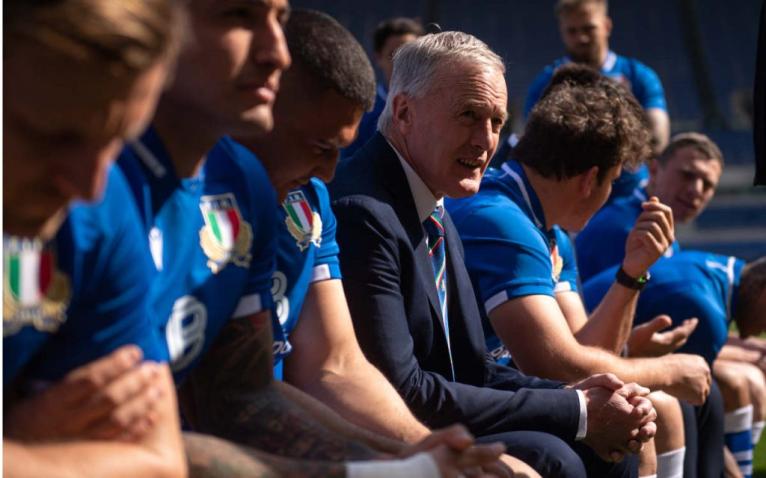
If we’re talking money and ego, we need look no further than France, where club presidents tout lavish riches and issue bombastic statements, occasionally veering into megalomania. They have the financial muscle to pay out any coach deemed scrapheap material. Last season alone, head coaches were changed at Clermont, Bordeaux-Begles, Lyon, Castres and Brive – more than a third of the Top 14 clubs.
“Coaching in France is like the Discovery Channel,” chuckles James Coughlan, the burly former Munster back-row, who has just left Toulon. “Every few months they have a Shark Week.”
Coughlan lost his job overseeing the Challenge Cup winners’ set-piece and defence because the club had promised it to Sergio Parisse when the great Italian totem retired.
“The contract [for Parisse] was organised before I even knew about it. I was never in a position of strength. Nothing changed since I became aware I wouldn’t be here. I still came to work at 4.45am and didn’t leave until 5pm.
“There is no job security. There isn’t. You know that. It’s based on what happens on the weekend, and sometimes it’s not even based on results.
“Pierre-Henry Broncan was on a huge unbeaten home run, they lose a home game and he gets the sack from Castres. Christophe Urios gets Bordeaux-Begles to their first semi-final, they had an indifferent start to the season, and he is sacked. Jeremy Davidson lost his job at Brive and took over at Castres. Urios has taken over at Clermont after they sacked Jono Gibbes, who left La Rochelle to go there.
“Franck Azema left Clermont, he comes here to Toulon. Pierre Mignoni leaves Lyon, he comes here. Xavier Garbajosa leaves Montpellier for Lyon, and then he gets sacked.
“It’s musical chairs in France at the moment, and when you come down to my level it’s even harder again. You’ve 30-35 guys every year who retire and want to get into coaching. The market is getting smaller in the number of roles , and the number of people looking for roles is getting larger and larger as the years go on.”
If you’ve only been exposed to the amateur era then you go into administration, you have no friggin’ idea. You have people who played back then and think it’s still like that.
It usually takes time to affect change in rugby. There are limited funds and no January transfer window. When Geordan Murphy, Leicester icon and player of 16 years, stepped up to become interim head coach, he thought his remit would be ship-steadying and fort-holding. Tigers had rattled through Richard Cockerill, Aaron Mauger and Matt O’Connor in short order by late 2018. Murphy was a concerned assistant coach. Two months into the top job, he was offered it permanently.
He set about signing shrewdly, drip-feeding in the Freddie Stewards and Jack van Poortvliets, and cutting well-paid but underperforming stars from the wage bill. Steve Borthwick arrived in 2020 and Murphy happily moved up to the director of rugby position. “Turning an oil tanker which is full of holes” was how he described reviving the fallen titan.
But when Tigers continued to founder as the pandemic struck, the mood music changed. He was gone by the end of 2020.
“Originally the discussions I had with the chairman were, ‘it’s a five-year plan’. Very quickly, under pressure, it became, ‘no, you’re off the boat’.
“There’s only so much you can do with other people’s teams. In football, you can get rid of players if they’re disruptive or toxic or not the players you want, you bring in your full coaching staff – the money is there to do that. In rugby union, it’s not. It’s going to take most people a couple of years to turn it around.
“There has to be something said about legacy, the way you leave things for the next bloke. It’s not as simple as going in and making an immediate change. Most guys would say, ‘look, if you get two or three years and it’s not good, then fair enough. Judge me not on this season but the way I build.’ It’s already coming out in Steve’s rhetoric with England. That’ll be consistent rhetoric for the next World Cup cycle.”
Coughlan fears many French clubs are doomed to ride the same short-term, emotion-driven merry-go-round.
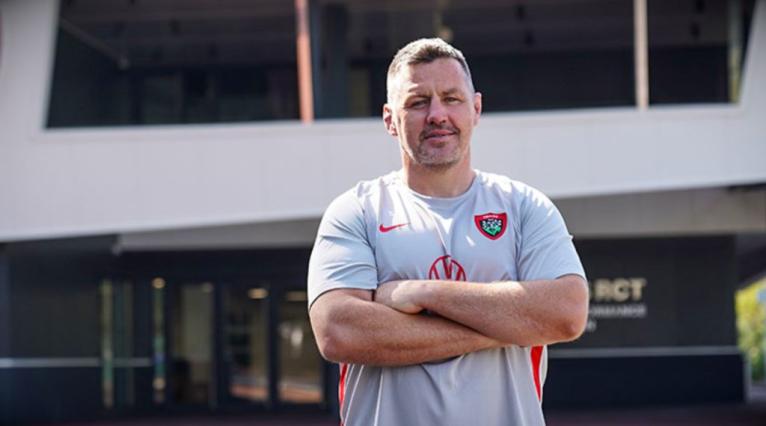
“The clubs need to be more discerning with who they put in, and whether they want a head coach or a director of rugby. Do they want a manager with three assistants who can all be head coaches, and he is stepping in and out of sessions with little bits, coaching the coaches, and doing the other shit in the background? It depends on your structure.
“But if your end product is the weekend, the weekend, the weekend, you get head coaches whose only concern is the weekend. When they leave, there is nothing structural behind it.
“One of the big failings in France is if you don’t have a president who is thinking, ‘if we go and sack the head coach, are we structured behind it to be able to look after the rest of the club? ‘”
Crowley is “devastated” by the FIR’s decision. As an amateur-era player of nearly 62 years old, he is alarmed by how many of his contemporaries are running elite teams without immersing themselves in the professional game.
“If you’ve only been exposed to the amateur era then you go into administration, you have no friggin’ idea.
“Way back in the 1980s when I played it was all about rah, rah, rah, go out and give it s**t. You have people who played back then and think it’s still like that.
“I don’t know that you’re going to make a lot of changes around it unless you have people who understand modern-day rugby making those decisions.”
Some other kid with a phone is going to tell my kid I’ve been sacked.
The Tigers episode still gnaws at Murphy, though he took some joy from the stunning Premiership title win a year ago. The stark, transaction reality of the game was laid bare. The volatility rocked him.
“It’s worse when you’ve been there as long as I was. I would have banged on about loyalty, especially in my team talks when I was captain; I would have mentioned the Leicester family quite a bit.
“The reality is, it’s just business. They’re not your family, they don’t really care about you. That was prevalent when I spoke to a lot of players after I’d left: Leicester, as a club, was terrible in how it treated its ex-players. There are some of the biggest names in English rugby who would say the same thing.”
There’s a hidden and sordid impact to all of this. Coaches, as a rule, know the brickbats will come and the Twitter experts will spout. That’s the game. Especially now. For those around them, it is far tougher to stomach. Uncertainty reigns. Families are uprooted. Social media swims with venom. When asked about how his dismissal from Glasgow Warriors affected his children, Danny Wilson tells a grim story.
“I was told when my sacking would be announced and I was in such a state of shock I just went, ‘yeah, fine’,” says Wilson, let go after Glasgow were hammered by Leinster in last year’s URC quarter-finals. “I only realised later that with social media, some other kid with a phone is going to tell my kid I’ve been sacked. I phoned up and asked them to delay it an hour so I could pick the kids up at school and tell them. My eldest was like, ‘so we’re moving?’. Well, I can’t answer that question until I know where I’m going next.
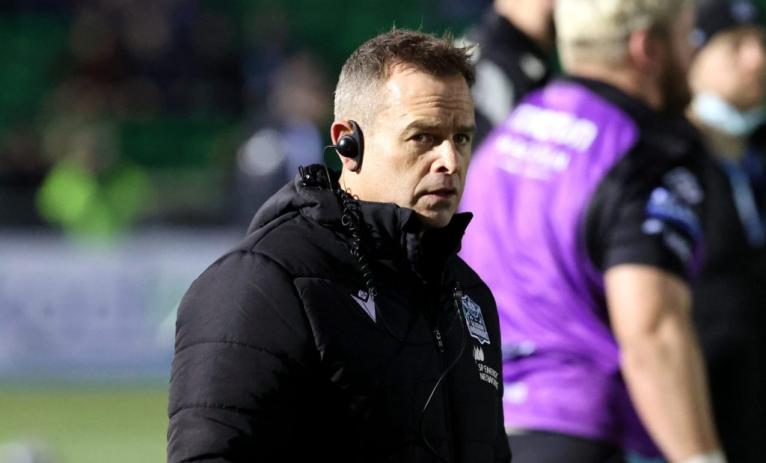
“Another kid did say the day after, ‘your dad got sacked’, in the way schoolkids do. My daughter is resilient enough to deal with that but then the uncertainty comes: where are we living, where am I going to school? I can’t answer those questions until I’ve found another job.”
Coughlan’s departure from Brive followed a similarly unpleasant routine.
“I rushed home to tell the kids. I needed to be the one to tell them.
“We sign up for this; our families don’t. There’s very little respect in regards to articles written, every time you’re picking up L’Equipe there’s somebody else replacing you. You can’t go to the shops or the playground with the kids without somebody saying something to you. Patrice Collazo was being followed home by supporters when he was head coach at Toulon.
“I got it every weekend. There’s always some hero. You do need a rubber neck. Everybody behind a keyboard is the greatest lineout coach, greatest defence coach, greatest head coach – they know better than you. You’re getting tagged and messaged. My Twitter is an open one and I don’t pay any attention to it. My Instagram and Facebook are private, they’re for my mates, pictures of the kids, they’re closed off.
“People look you up and send you messages and part of you wants to go, ‘look I’ll be here at 8 o’clock, come and we’ll have a chat’. And part of you knows they only want that reaction so they get the screenshot of you saying ‘come down here and I’ll sort you out’.
“If they really wanted to be involved, all the age-grade teams need coaches, all the clubs need coaches and volunteers. If they really had an interest in the club, then come and see our work. For a seven or eight-minute video, it takes about 12 hours of footage for me to cut down. No-one sees that; they only see what happens on the weekend.
“The little fella is asking where you’re going next year and you maybe haven’t spoken to him yet, he’s just making friends and we up sticks and off we go again.”
I remember her being really upset on a weekly basis with former players who would comment and get involved on fans forums. She used to get so anxious.
Murphy detached himself from social media, but all other aspects of the job consumed him. He became a transient ghost in his own home.
“My in-laws are big into a Sunday roast for the family and they said I was never present. I’d be checking my phone, stepping up and walking away to take calls, wasn’t talking, very insular, and it was just eating away at me.
“I don’t read [social media] but my wife does and I remember her being really upset on a weekly basis with former players who would comment and get involved on fans forums. At the end I was just like, ‘please don’t read things’.
“She used to get so anxious before games and during the games. She’d go with the kids but she never enjoyed it, it just felt like she was on hot coals the whole time because she knew regardless of if we won, there’d be a huge amount of people who’d come out and slate the team.
“Sometimes it was faceless people, bots, and sometimes it was people she’d know. She really struggled with it. That was one of the reasons that, with a young family, do you want to go back into this trench? It’s not pretty.”
The online barbs can stoke genuine danger. Wayne Barnes and his family – horrifically – know all about that. Ben O’Keeffe was bombarded with bile in the wake of the Super Rugby final. Language used to critique referees, and the effect of that language in fanning flames of discontent, is an issue for coaches.
Cohen was often the public face of Leicester’s hierarchy, whether or not he agreed with its actions. He was pilloried, spat at and even received death threats.
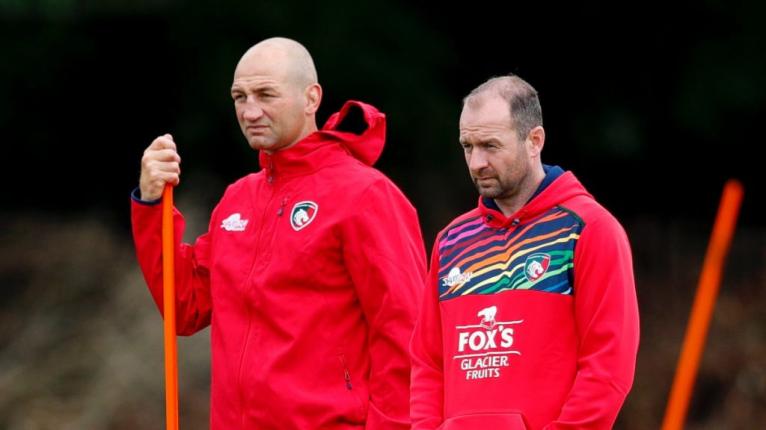
“The game has to be very careful because social media does stoke up a feeling of ill will to somebody. Manchester United fans tried to burn down Ed Woodward’s house. When you go down the road of having fans demonstrating outside people’s houses, in rugby you generally can’t afford the electric gates and security, and that does pose a significant threat to the wellbeing of the game.
“One of the great things about rugby has been that players, coaches and officials have all been very accessible. You dramatically change the nature of the game if that changes. That’s something I’d be worried about.”
Crowley has a Twitter account, though it is operated by his son. He’s too long in tooth to be swept up in the cesspit, but he is worried for those who will follow.
“Soccer teams go through two or three coaches a season. Is rugby going to get to that? I bloody hope not, but it could do. It is going that way now. It’s a business world in the end.”
Cohen takes a more reserved view.
“The pressures on coaches follow a very similar pattern to football. When a decision is made, it is often not made for the right reasons, but I don’t see us going down a slippery slope yet of the Premier League in football where sackings are made willy-nilly. But rugby does follow football, which is a much more mature sport. You have to assume, when finances allow, rugby will follow the lead of football, but I don’t see it happening quite yet.”
Is the coach getting the chop because if he doesn’t, then the board will? If the board gets rid of the coach it looks like they are doing something and that’ll keep the fans happy?
These men tell different stories, but share a collective message. Before wielding the scythe, look beyond a dip in form, a struggling team, a grumbling fan base, to determine whether it really is the coach to blame.
“The deep-seated root of the problem has to be found,” says Hansen. “If it is the coach then fine, sack him. But if it’s not him… look at England, we know Steve Borthwick is a good coach, Eddie Jones is a good coach. Nothing has changed in the England performance. So there is a deep-seated issue that has still to be addressed. It’s not the coaching that’s doing it, it’s something else.
“Club coaches get chopped pretty quickly if they’re not winning. Is he getting the chop because if he doesn’t, then the board will? If the board gets rid of the coach it looks like they are doing something and that’ll keep the fans happy? Again, they are saving themselves. Or is it because we don’t want to spend money for talent? You can’t win if you don’t have talent.
“I find it interesting because it is always the coach’s fault if you’re not winning. Invariably it’s a lot deeper than that. But our world is not patient, we’re not prepared to go through a bit of adversity to sort a problem.”
Hansen and Crowley are gnarled warhorses of the coaching game. Coughlan has been in France long enough to have seen the halo and the horns. Wilson found roles at Leicester, and now Harlequins, months after his sacking, but a flight from Scotland, where his family have settled. Cohen is back in rugby as an agent, not a chief executive. Murphy has little interest in returning to the front line.
While everyone seeks a winning cocktail, coaches remain the most dispensable ingredient. Even when the whole recipe might be wrong. Rugby places great strain on them. Just like its cross-code footballing cousin, it’s a ruthless old business.


Coaches are only as good as the players they have in their team ; great Coaches have great players occasionally a coach turns a bunch of potentially unrecognised great players into gold....but it is down to determination, discipline and dedication by players